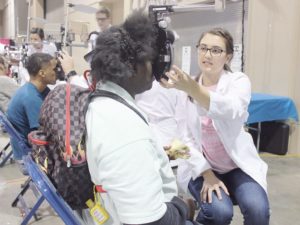
Admit it: Sometimes you go out of your way to avoid a homeless person.
So do I. I’m not proud to say it, but it’s true. If I can’t cross the street to evade them, I search my brain for my pre-programmed “no” response to their inevitable request for a dollar.
“I ain’t got it, bruh,” is my go-to line, which, too often, is simply the truth. It’s not danger that I feel. If you’re like me, the problem with having even a brief conversation with a homeless person is that you come away feeling conflicted.
Clearly, this person needs more than a dollar’s worth of help, but the problems they face are often so complicated, it breaks your brain. It’s easier to pretend not to see the problem than it is to fix it.
When I learned that the Community Alliance for The Homeless Inc. was hosting Project Homeless Connect-Memphis at the Cook Convention Center last week, I made a point to go. It’s an annual event that connects the homeless with organizations and resources to help them get stabilized – housing and job placement services; mental health and addiction counselors. The wait for eye exams and hair stylists were among the longest. It’s a feel good story, no doubt.
More than that, though, I wanted to listen. What has to happen for one to find themselves sleeping under a bridge? Why is it so hard to stay off the streets?
What is it about being homeless that everyone should know?
Darrell Thomas, 54
Darrell Thomas is a double amputee. By trade, he’s a carpenter, a fix-it guy. He lost his right leg in 2003, while he was working on a car on the side of the road. His left leg?
“It was just a spider in my shoe,” he said.
Thomas said he found himself on the street earlier this year, after he reported unsafe living conditions in his apartment building. He said his landlord retaliated by refusing his rent and evicting him for nonpayment.
“It’s a slick way of doing slum lord evictions,” Thomas said.
I mentioned that everyday people don’t really get to hear from people living on the streets. Thomas took over from there.
“That’s because most people that got a home don’t want to be bothered with the people without a home,” he said. “They feel like the person living out here in these streets, that’s currently homeless, that they’re here because that’s something they want to do.
“But that person isn’t homeless because they want to be. They’re there because certain life circumstances put them in that situation,” he continued.
“But the person in the home needs to realize,” he warned. “They’re just one mistake from being homeless themselves.”
I asked if that was true for most people. Thomas chuckled.
“That’s true for the president,” he replied.
“There used to be a time when I felt like I could never sleep in a shelter . . . or even ask somebody for help,” he added. “But sometimes God puts you in a situation where you have to ask for help or you have to receive it whether you want it or not.”
He believes that if more people had the experience of homelessness, it would help them understand the difficult circumstances that force people onto the street – and the depths of despair that can come with it.
“If they were living through those exact same circumstances, the question they would have to ask themselves is this,” he said. “Do I want to fight through this? Or do I want to die?”
Open, candid and thoughtful, Thomas said, “A lot of people think I take my situation as a big joke, because I try to laugh all the time. But they don’t realize: I try to laugh all the time to keep from crying all the time.”
A few seconds after our interview, Thomas was approached by an acquaintance. They cracked jokes – the way black men do – before Thomas wheeled away.
Given what he’d just told me, I wondered if he was crying inside.

Felicia Jordan, 26
Felicia Jordan was getting her hair done when I spoke with her. She and her two children – a six year old and an 11 month old – have been staying in shelters for about a year. Joblessness and sporadic child support made it impossible to pay her bills or keep a roof over her head.
I asked her what most of us – including me – take for granted that she doesn’t. In hindsight, it’s a stupid question. Jordan’s answer was obvious but poignant.
“Just waking up and knowing you have somewhere to sleep,” she sighed. “That you’re going to eat breakfast. That you don’t have to leave the house if you don’t want to.”
That last answer is telling. Though she’s grateful to stay in a shelter, the rules stipulate that each day she and her children must leave by a certain time each day, “even if we don’t have gas or a bus to catch,” she said. “
As for work, Jordan would like to work in a warehouse. “They usually pay every week,” she said. “When you have kids, you can’t wait two weeks to get paid. You have to make sacrifices.”
And like any parent, she puts on a brave face for her children.
“You know, you have to keep a smile in place for your kids,” she said. “You don’t want them to see you down because you don’t want them to get down.
“My oldest questions me,” she continued. “Like ‘Ma, when are we going home? When are we going to have a place?’ She’s very advanced.”
And like many parents, she fibs to keep hope alive.
“I just tell her we’re one day closer,” Jordan said. “I don’t know when we’re going to have a home. I just try to keep her smiling. I just try to keep her mind off of it, that’s all.”
The homeless are people too
I didn’t get a chance to talk to many more people there. Many were too busy trying to get supplies and services. Others didn’t want to talk or be photographed for this story.
From the limited conversations I had, I realized that there were dozens, if not hundreds, of similar stories wandering around that convention hall. I thought back through the lean times in my own life, when I was living hand-to-mouth. In hindsight, I was probably closer to homelessness than I even realize now – just one more bad break.
I’m not about to say that I now have a dollar for every panhandler who asks. Alcoholism, addiction and mental health problems are still persistent among Memphis’ homeless population, and a dollar won’t fix that.
But I’m grateful that the Community Alliance for the Homeless hosts this event each year, and I’m grateful for the volunteers who help with it. It gave me a chance to see beyond my own biases, to see that underneath the torn clothes, the odors and the unkempt hair, there’s another human.
Just like me. Just like you.
(To donate or volunteer with the Community Alliance for the Homeless, visit: www.cafth.org.)




